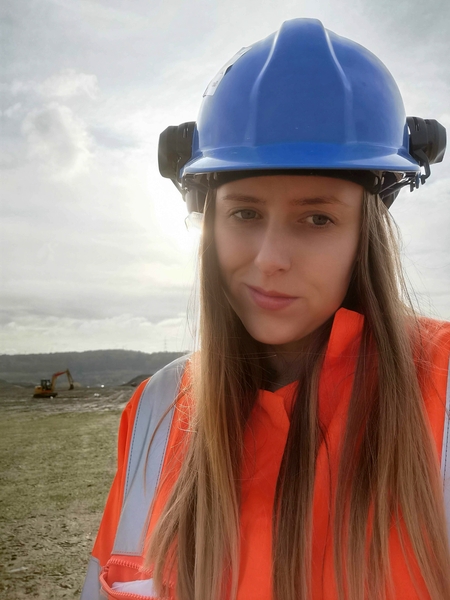

Senior Engineer Zoe Horrell on finding the perfect course and launching her career in STEM
4 min read
British Science Week is a national event that provides a platform for educators, professionals, communicators and the public to recognise and celebrate the work being undertaken in STEM related fields (Science, Technology, Engineering, Maths). This year’s theme is ‘Innovating for the Future’ and, with so many Portsmouth graduates working in STEM, we want to showcase the important work they’re doing and how they are innovating for the future in their roles.
BEng (Hons) Engineering Geology and Geotechnics 2016 graduate Zoe Horrell is a Senior Engineer at CGL (Card Geotechnics Ltd). Here Zoe tells us how her STEM career began and how she’s innovating for the future:
How did you get into STEM?
I really enjoyed studying A-level Maths. Unlike any other subjects areas, maths is not subjective; there is no grey area. Every question has a clear answer and when you solve it, you can either be right or wrong. I personally enjoy this objective approach and the certainty that comes with it.
In addition to maths, I loved my A-level Geology. This subject gave me an understanding of the active, living and breathing planet beneath our feet. Geology is no longer just rock or soil. It was formed by a process and is undergoing constant change, evolving all the time just like an organic being. The effect we’ve had on the earth will be seen in millions of years to come. I also love the fact that geology feeds into everything around us. Society is literally built on geology and it affects everything from the type of flowers that grow to the placement and design of major infrastructure such as skyscrapers, roads and tunnels.
I’m innovating for the future by using GIS, combined with Lidar data, to delineate slope hazards more accurately (with respect to a pylon tower location). Early-stage assessment of route hazards allows us to conduct surveys and intrusive site investigations that target specific locations and hazards for further evaluation.
Zoe Horrell, BEng (Hons) Engineering Geology and Geotechnics (2016), Senior Engineer, CGL
Your time at Portsmouth University
When I started thinking about university, I knew I wanted to find a course that combined all of this. I saw that the University of Portsmouth offered a BEng Engineering Geology and Geotechnics degree, I immediately applied and from there my STEM career took off! The course was perfectly designed for the type of role I wanted and had links to the industry. In addition, it offered a placement year which I grabbed with both hands as I wanted to gain as much industry experience as possible. I undertook my placement year with a small consultancy called Red Rock Geoscience in Exeter and I applied the subjects I had learnt at university to real civil engineering projects. It was a steep and challenging learning curve but was very rewarding to see a project I helped design come to life.
Your career path after graduation
After graduation I joined a large consultancy called WSP as a graduate engineer. My role within the company was to manage ground investigation projects and undertake interpretation of factual data from those investigations. I wanted to continue broadening my knowledge of geotechnics so I applied for a distance learning master’s degree in Advanced Geotechnics at the University of Surrey, which I’ll be finishing in summer 2022.
In February 2018, I started a new role with CGL, a specialist geotechnical and geoenvironmental consultancy. As a Senior Engineer, I work on all stages of projects with a team of people which can be either geotechnically or geoenvironmentally focused. We provide advice and design solutions on a broad range of ground-related issues and consider soil and rock behaviour from an engineering perspective. This involves assessing the load that a certain soil-to-rock can take before failure, slope stability and the risk of landslides, and the effects of building structures on the wider area.
In addition to this, we provide engineering solutions relating to environmental impacts of contaminants within soils such as understanding the migration, interactions and fate of contaminants, the protection of uncontaminated regions and the remediation or clean-up of contaminated sites. We have to make sure any contamination onsite does not pose a risk to human health or controlled waters (such as our aquifers we get our drinking water from), and if a risk does exist, mitigating these risks through monitoring, remediation and/or containment.
Tell us more about your role
A lot of the data that I deal with on a daily basis is spatial (meaning it relates to a position or area). With the development in Geographical Information Systems (GIS), as part of a team, I have been working towards utilising this system for the work we do. The system analyses the spatial data and organises layers of information into visualizations including maps and cross-sections. With this unique capability, GIS reveals deeper insights into the data, such as patterns, relationships and situations; helping us to make smarter recommendations to clients and cutting-edge designs.
The role provides me with challenges which allow me to continually learn and innovate, which I really enjoy. I find it rewarding to see projects go from proposal stage all the way through to a fully functioning structure.
What would be your advice?
STEM encompasses a wide range of career choices therefore my advice to anyone looking to get into this field is don’t let anything deter you and keep an open mind about new opportunities.
